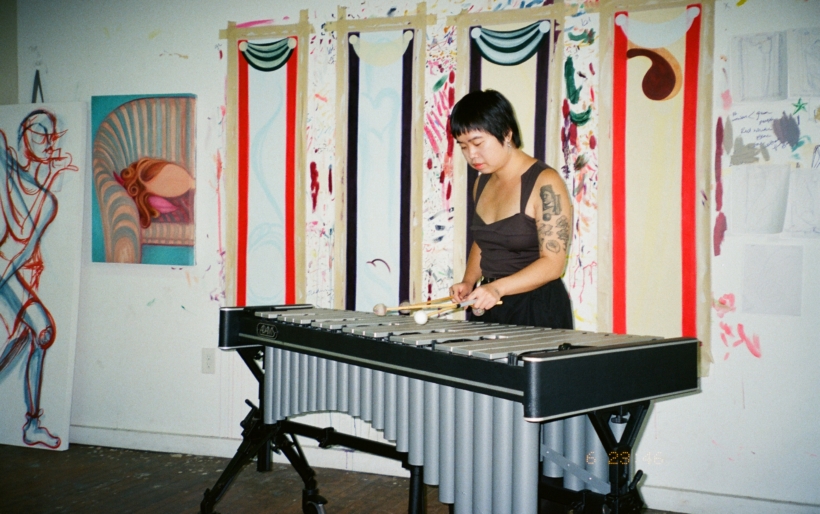Salina Kuo carves out a space between indie and R&B/soul using vibraphone harmonies
The Philadelphia-based musician reflects on grief, healing, community, and the vibraphone’s role in their evolving artistry

Photo by: Rita Thompson
When Salina Kuo first began writing songs, it was quietly at the piano, experimenting with melodies that blended jazz ballads and instrumentals reminiscent of Tyler, the Creator’s Flower Boy. Now, with St. John’s Wort and a new album due this spring, Kuo has developed a sound that is unmistakably theirs: atmospheric indie-R&B threaded with vibraphone harmonies, jazz-inflected chords, and lyrics shaped by lived experience.

A percussionist by training and a self-taught guzhengist, Kuo also leads the freak-folk ensemble River Full of Fruit and holds a degree in orchestral percussion and music education. Studying classical music gave them a strong technical foundation, but it didn’t offer the freedom to make their own musical choices.
“While I learned a lot from studying Western classical [music], I didn’t feel autonomy as a musician. Classical compositions typically tell you exactly what to play and how to play it. There was no agency,” they explained to me. In hopes of exploring their creative voice more deeply, Kuo says, “I took a couple of semesters of jazz vibraphone lessons to force myself to improvise, spend time at the instrument, and make my own musical decisions.”
The first songs Kuo wrote were solo piano pieces, described by friends as reminiscent of jazz ballads, Carole King, and instrumentals from Tyler, the Creator’s Flower Boy. When they began imagining how those songs might sound in a full-band context, though, the translation wasn’t seamless. “Arranging melancholic piano ballads for a rhythm section (guitar, bass, drums) without a clear vision made them sound more upbeat, more funky, and it didn’t feel quite right,” Kuo recalls.
That search for a sound that felt authentic led them to the vibraphone. During quarantine, without access to college facilities, Kuo sought an instrument that allowed for both improvisation and portability. “The truth is, marimba was my favorite instrument to play in college, but those are more expensive and harder to transport,” they shared. Over time, the vibraphone became a defining element of their music, shaping their approach to melody, harmony, and texture.
“I listened to a lot of bedroom pop, alternative, and R&B when I started writing songs, so it comes out in my playing,” Kuo explained. “Mallet percussion has roots in Africa and Asia, and the vibraphone is prominent in jazz music. Jazz is the backbone of American music, so it feels like a natural progression to play indie-R&B songs on vibraphone.”
For their first EP, my kind of love (2022), Kuo aimed for a more mellow, neo-soul-inspired sound. Later demos like “Laurie” (released on the compilation comp.01 (2023) by People Places Records) explored more indie-rock sensibilities.
“For this album, I found myself writing vibraphone parts inspired by the roles that piano and synth take in classic soul and indie pop, respectively,” Kuo shared. Alongside shaping their sound through instrumentation, Kuo also found meaning in the name of the band itself.
“St. John’s Wort is a wildflower that can be used for depression and anxiety,” they explained. “It represents how songwriting brings me relief from the struggles and big emotions I’ve experienced, which includes living with depression. I like that it’s natural to the earth, and the name sounds kind of funny.”
The themes of grief and healing have become increasingly central to Kuo’s work. In 2022, they lost their oldest brother to suicide. “It broke my sense of reality. My whole life stopped. When I returned to music, I wrote [what became] this album to process my grief,” Kuo says. Where my kind of love explored optimism and clarity after leaving an abusive relationship, these new songs confront sadness, anger, and guilt head-on. “Trying to find truthful expressions of my present experience in songwriting was cathartic. I think I’ve healed more from seeking release than seeking comfort.”
Kuo’s approach to songwriting is deeply intentional. “Usually, there’s a feeling I can’t shake or a thought that keeps going around my head that turns into a lyric,” they explained. “I draft lyrics in my notes app and take a lot of voice memos of everything—trying out different vocal phrasing, melodies, or chords. I listen back and edit as I write,” Kuo continued. Over time, their experience as a bandleader has also shaped the process: “I started hearing arrangement ideas as I write. Now, in the beginning stages of a song, I know what soundscape I’m chasing. I’m very inspired by genre. I like studying how musicians play in different styles and picking apart arrangements.”
Having consistent bandmates for this project, Kuo says, has also given them space to experiment with new songs and arrangements. “It’s collaborative in the sense that I can guide them towards an idea or be inspired by how they play,” they explained. “Joe [“Calo” Borsellino], Pete [Dennis], and I all have an admiration for avant-garde and free music, so we’re approaching [songs like “Deity”] from that angle.”
Their evolving approach is supported by Philadelphia’s music community, where friends and fellow musicians encouraged them to embrace a sound that didn’t have to fit neatly into one genre.
“When I started writing songs, I was very concerned with the music being likable and easily understood,” they admitted. “I wanted to feel safe by making music that fit neatly into a genre and easily appealed to people.” Over time, their focus shifted from conformity to connection, prioritizing honest expression over fitting expectations. “Years ago, I confessed this to Pete, and they said, ‘Well, ideally your music would be somewhere between R&B and indie music, because it’s yours.’ At the time, I didn’t know that was an option.”
Until recently, they’ve primarily shared new work through live performances of unreleased material. Now, they’re excited to give listeners access on their own terms.